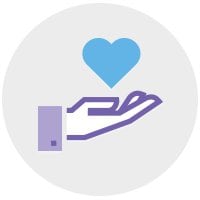Diabetes Treatment and Care
Both Type I and Type II diabetes require treatment and care to manage them effectively and reduce your risk of complications and problems. When you don’t take care of yourself, you increase the chances that your diabetes could get out of control and do serious damage to your body’s organs and tissues. To keep yourself healthy and safe, you’ll want to care for yourself the right way, and you’ll want to work with your doctor to get the treatment you need. That’s easy to understand. Where it gets harder is understanding the specifics of your care and treatment.
Complicating things is the fact that there are several issues to address when you have diabetes. The good news, however, is that the more you know about these issues, the more comfortable you’ll be handling your condition. You’ll know what to expect, what to do if your blood sugar is too high or low, and when it’s time to call the doctor. That can take some of the stress out of managing a chronic condition and allow you to feel more confident about your ability to deal with diabetes for the long haul.
Treatment and Medication Options
Will You Need to Take Insulin?
If you have Type I diabetes you can expect to take insulin for the rest of your life, unless science comes up with a cure that hasn’t yet been discovered. That’s because a Type I diabetic’s pancreas just doesn’t make insulin like it’s supposed to, meaning the body has to get it from an external source. There are other options besides insulin for some Type II diabetics, but for those with Type I, insulin is going to be necessary to regulate their sugar levels properly.
Some Type II diabetics also need to take insulin, depending on how unstable their blood sugar levels become, how high their blood sugar rises after eating, and other factors. On the other hand, some Type II diabetics have other medication options that may work better and control blood sugar just as well as insulin would. If you have Type II diabetes, you need to talk with your doctor to be decide whether insulin is the right choice for you. That way you can know that you’re doing the right thing for your overall health and safety.
Do You Need An Insulin Pump?
If you have Type I diabetes, one of the options you can consider is an insulin pump. These aren’t for everyone, as they are generally only used for very serious cases of diabetes that can’t be controlled with injectable insulin. These pumps are the last resort, in most cases, and they are attached to the body where they deliver insulin in a constant stream or at set intervals and amounts, depending on the person who is using them and exactly what that person requires. Overall, these pumps can save lives and protect Type I diabetics from organ damage and spikes in their blood sugar that could cause significant problems.
What Other Medications Might You Need?
Medications such as Glyburide and Metformin are used by people who have Type II diabetes. These are both designed to lower blood sugar, but they are not the same as insulin. They can be taken in pill form instead of injected, and they come in a number of different doses. They also don’t need to be taken right before or after a meal like insulin sometimes does, and they can be taken in the morning or at night, depending on the dosing schedule set out by your doctor. There are several different options for medications that treat Type II diabetes effectively, and your doctor can help you choose the one that’s right for you.
Watching Your Blood Sugar Levels
Buying a Glucose Meter
As a diabetic, you should check your blood sugar frequently. Depending on whether you have Type I or Type II diabetes, how long you’ve had your condition, and how well controlled your blood sugar has been over time, you may need to check your sugar multiple times per day. Some diabetics, however, need only check their blood sugar levels once a day, or even once a week. Your doctor will help you set a schedule. Following your doctor-prescribed schedule is essential: not only do you need to track your blood sugar, you’ll want to know as soon as possible if the medications you’re taking are keeping your blood sugar under control.
The glucose meter you choose doesn’t have to be fancy or expensive. While many people choose a glucose meter with extra options and features, you can choose a simple and inexpensive model and still get the information you need. Glucose meters are tested for accuracy and reliability, so the brand and the price are not as important as checking your sugar consistently on a schedule set by your doctor. That’s what will help protect you from damage due to high blood sugar.
Where to Get Test Strips
Test strips for your glucose meter can be purchased at pharmacies and retail stores, as well as online vendors. Just make sure of two things: that the strips are the right ones to use with your particular meter, and that you are buying them from a reputable source. Be sure to check the date on any strips you buy, because outdated strips may not give you an accurate reading. If you get your strips from a source you can trust, though, they should never be outdated. Stores that stock these items understand how important it is that people get accurate blood sugar readings each and every time, and they avoid stocking expired strips.
Avoiding Health Problems From Diabetes
Working to Reduce the Neuropathy Risk
Neuropathy, or nerve damage, is a common problem for people whose diabetes isn’t well controlled. Fortunately, you’ve got a good chance of avoiding neuropathy when you take care of yourself and monitor your sugar closely. The more closely you follow your blood sugar levels, the more easily you can make adjustments that will control it and reduce complications. By working with your doctor, you can get good information about ways to avoid neuropathy as a complication, and about what to look for in case the condition does start to develop. Taking action quickly can make a difference.
How Do You Control Your Blood Pressure?
Even though blood pressure and blood sugar aren’t related, in that one doesn’t cause the other, they are both highly important. Both can damage organs and tissues, along with veins and arteries, and often people who have one problem also have the other. That’s worth considering, because you need to address every possible risk to your health to live the healthiest and best life possible. As it happens, you can control your blood pressure with some of the same strategies that control your blood sugar—that is, diet and exercise. If your blood pressure remains high, however, medications are worth taking to protect yourself from the worst outcomes.
Diabetic Foot Care Is Very Important
One of the most overlooked problems for diabetics is foot care. Because of circulation issues related to high blood sugar and organ and tissue damage, a diabetic’s feet can become injured easily, and such injuries can take longer to heal. When this happens, you can even lose toes or an entire foot to diabetes. This can be avoided in the majority of cases, but you need to take good care of your feet and protect them as much as possible. Wearing shoes that offer good protection but are also breathable is important, and when you do that you go a long way toward making sure diabetes won’t cause unnecessary problems with your feet.
You should also consider taking a frequent careful look at your feet to make sure you aren’t developing any sores or other problems. If you do start to see issues, work with your doctor to treat them aggressively and as soon as possible. That will reduce the chances that you’ll have more serious concerns develop and enable you to clean up any problems that are starting to occur. Sores are the most common, but problems with your nails and pain in your feet can also become concerns for diabetics who aren’t managing their blood sugar well or caring for their feet the right way.
What If You Need Surgery?
There are two issues with surgery when you’re diabetic. The first is that you may need surgery to repair or correct damage that the diabetes has done, or to stop that damage from getting worse. Second, even if you need unrelated surgery, you will need to make sure your body is healthy enough and that your diabetes is as under control as possible. No matter why you need surgery, talk to your doctor about your diabetes and how you can help minimize your risk of complications and problems. The more informed and careful you are, the lower the chances of having a problem develop during or after your operation.
Diet and Lifestyle Changes to Treat Type II Diabetes
If you have Type II diabetes, you may be able to reduce or eliminate your need for medication by modifying your lifestyle. If you get plenty of exercise, eat healthy food, and avoid sugar as much as possible—and lose weight, if you’re heavier than you should be—your diabetes may actually go away. That can’t happen with Type I diabetes, but it’s possible with Type II, since most of the cases of this condition start from being overweight or obese and living an unhealthy, sedentary lifestyle. Little changes can go a long way.
Is Weight Loss Necessary For You?
Among the many ways to try and treat diabetes is through weight loss. This won’t make that much of a difference for someone who is a Type I diabetic, because their condition isn’t caused by excess weight. But for people who are Type II diabetics, losing weight can make a significant difference in whether they need medication and how much they have to take. That is not to say that weight loss isn’t also good for Type I diabetics who are overweight (exercise is always essential for good health), but the main issue is that losing weight can sometimes reverse diabetes in someone who is a Type II diabetic.
How Should You Modify Your Lifestyle?
Modifying your lifestyle can be helpful in a lot of cases. If you’re a Type I diabetic, your biggest lifestyle modification is probably going to be how often you check your blood sugar and use insulin. Additionally, your diet may be more carefully planned and monitored than the diet of someone who doesn’t have diabetes. The goal is to keep your blood sugar levels as stable as possible, and that can be difficult to do if you aren’t watching what you eat or monitoring your blood sugar frequently. Follow the schedule and diet your doctor has given you, and you’ll have a better chance of successful lifestyle modification.
For people who have Type II diabetes, diet, weight loss, and exercise are the biggest considerations when it comes to changing your lifestyle. Those changes may be enough to reverse your diabetes and eliminate your need for medication. Even if you still need to take medication, you may have to take less of it. You’ll also reduce the chances of complications and help protect your heart and other organs from the damage that diabetes can cause. The more you live a healthy lifestyle, the more likely you’ll be to reduce your risk. That can give you peace of mind and help you feel better both mentally and physically.
Overall, there are many facets to diabetes treatment and care. When you’re first diagnosed it can feel overwhelming and stressful, but it doesn’t have to be that way in the long term. You can learn about your condition and the best way to manage it, which will make it much easier to handle as time goes on. Whether you have Type I diabetes and are trying to prevent it from damaging your overall health, or whether you have Type II diabetes and are trying to reverse it with lifestyle changes, you have options, and they can help you live a stronger, healthier, and happier life.
As a diabetic, you should check your blood sugar frequently
About Diabetes
- Diabetes and Family History: How Much Risk is Genetic?
- Gestational Diabetes: What Is It, and What Causes It?
- Diabetes Symptoms, Diagnosis, & Testing
Diabetes Administration
- Diabetes Treatment and Care
- Diabetes: A School Guide for Effective Blood Sugar Management
- Diabetes: The Value of Just One Step
Diabetes Resources
Didn't Find the Answer You Were Looking For?
Find Affordable Diabetes Plans in Your Area
© 2017 YourDiabetesInfo.com All rights reserved.



